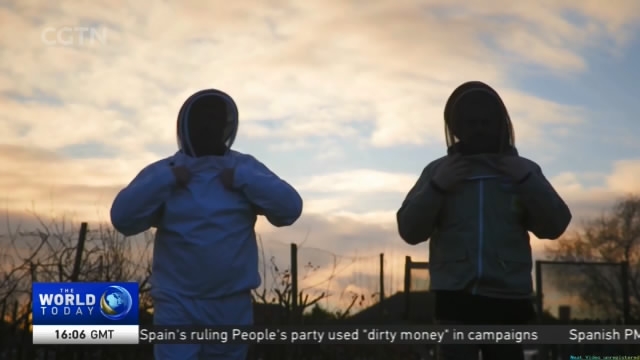
09:11, 25-Jan-2018
Green Growth: World to seek balance between economic growth and environmental protection

The Forum in Davos tries to find ways to spur economic growth and save the environment -- two issues, many say, that cannot be separated. As part of our special series on green growth, CGTN's Jack Barton traveled across Europe and Asia to discover the challenges -- and possible solutions.
JACK BARTON LONDON "The industrial revolution began here in Britain, a revolution that marked a turning point in human history that utterly transformed our economies. As a result, people's lives have, in many, greatly improved. Here in England life expectancy has climbed from around 40 years in the mid 1800s to currently almost 80 for men and older for women. At the same time the global population has leapt from a little over one billion to more than seven and a half billion today. But even though our climate has always been changing, global average temperatures have been rising with unprecedented speed while at the time agriculture and industry have led, and is still leading to, massive species declines and extinctions."
MARCO LAMBERTINI DIRECTOR GENERAL OF WWF INTERNATIONAL "So in less than a generation we have lost half of the wildlife on the planet. We are heading towards two thirds decline by 2020 and a mass, as scientists say, we're already in a mass extinction."
In the UK many groups like the Royal Society for the Protection of Birds are trying to turn back the tide.
MARK EATON, HEAD OF BIRD MONITORING PROGRAM ROYAL SOCIETY FOR THE PROTECTION OF BIRDS "About 15 percent of the UK species are regarded as threatened with extinction from the country and we've seen great declines in large numbers, overall our bird land farmland bird numbers have dropped by more than 50 percent over the past few decades so we've seen big declines. What we see in the UK is being the same abroad in fact possibly even worse in other countries."
(JACK: What is driving this decline in bird numbers?)
"By far the single largest effect is agriculture. High productivity it's better for putting food on the plate, but it's had a real expense on birds and other wildlife. We also see other impacts, the effects of urbanization, expanding towns and more latterly climate change. All the drivers all the things that are acting upon our nature are to do with man, all these things have an impact and all tie to the economy."
JACK BARTON SANDY, UK "Of course it's not just birds that have a big impact on the environment. To get the big picture we need to talk about the birds and the bees. Many bee species are suffering what has been dubbed 'Colony collapse syndrome'."
TIM LOVETT PRESIDENT OF BRITISH BEE KEEPERS ASSOCIATION "They are vitally important to us in our modern lives because it's not just about honey it's their importance as pollinators. It's said that up to 30 percent of what we eat is dependent on insect pollination. If you had a bee free pizza, well no tomatoes the olive oil would be very expensive, you'd still have the base but even the mozzarella cheese you wouldn't be seeing that there."
Climate change is a serious problem receiving a lot of attention, including here at the World Economic Forum. But the alarming loss of biodiversity and an extinction rate one thousand times higher than it would be without human intervention is something still not making headlines.
JACK BARTON DAVOS "On the next and final segment of this series examining the need to start talking about economic growth and the environment as one issue we look at a government initiative in South Korea that's not only green but saving the state millions of dollars as well as an experiment in Germany where 100 families are trying to dramatically lower their carbon footprint. Jack Barton, CGTN, at the World Economic Forum in Davos."

SITEMAP
Copyright © 2018 CGTN. Beijing ICP prepared NO.16065310-3
Copyright © 2018 CGTN. Beijing ICP prepared NO.16065310-3